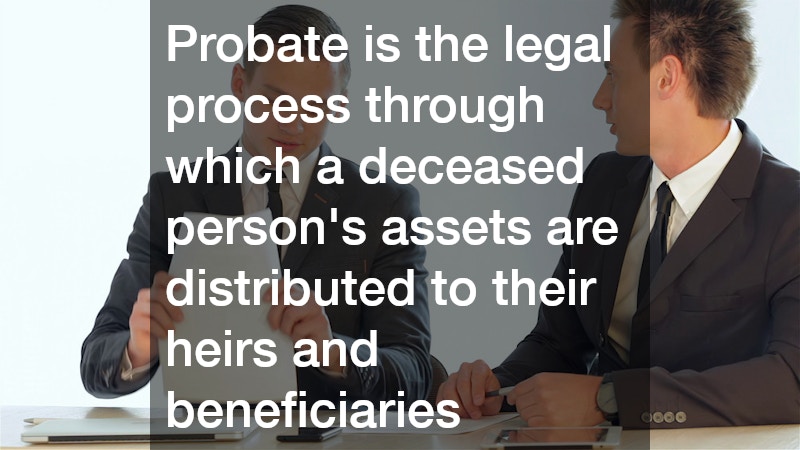Dealing with the estate of a loved one can be an emotionally challenging and complex task. Beyond the grief, there are numerous legal, financial, and administrative responsibilities that must be addressed. Navigating the probate process without professional guidance can be overwhelming, which is why hiring a probate attorney is often a wise decision. A probate attorney can provide essential expertise, streamline the process, and ensure that your loved one’s wishes are carried out efficiently and accurately.
Understanding the Probate Process
Probate is the legal process through which a deceased person’s assets are distributed to their heirs and beneficiaries. This process involves several detailed steps, including validating the will (if one exists), identifying and appraising assets, paying off debts and taxes, and ultimately distributing the remaining property according to the decedent’s wishes.
During probate, the court oversees these activities to ensure that the estate is handled fairly and legally. While the probate process is necessary to protect the rights of heirs and creditors, it can often be lengthy and complicated. Delays may arise due to disputes among family members, unclear or contested wills, missing documentation, or issues with asset valuation.
A probate attorney specializes in navigating these intricate legal procedures and acts as a trusted guide for executors or personal representatives. This expertise allows them to anticipate potential challenges and proactively address them, reducing the likelihood of costly mistakes or prolonged delays. By ensuring that all legal obligations are met accurately, a probate attorney not only streamlines the process but also provides peace of mind to families during a difficult and emotional time.
How a Probate Attorney Can Help
1. Guidance Through Legal Procedures
One of the primary ways a probate attorney simplifies the estate process is by guiding executors or personal representatives through complex legal procedures. Filing the necessary documents, meeting court deadlines, and understanding the specific requirements of your jurisdiction can be confusing without professional help. A probate attorney ensures that all paperwork is completed accurately and submitted on time, preventing delays and legal complications.
2. Asset Identification and Valuation
Another critical role of a probate attorney is assisting with asset identification and valuation. Estates often include a variety of assets such as real estate, bank accounts, investments, personal property, and sometimes business interests. Properly identifying and valuing these assets is essential for an accurate probate process. An attorney can help hire appraisers when needed, ensure accurate reporting to the court, and assist with resolving any disputes about asset ownership or valuation.
3. Managing Debts and Taxes
Handling debts and taxes is another area where a probate attorney can be invaluable. Estates may have outstanding debts, such as credit card balances, mortgages, or medical bills, that need to be paid before assets are distributed. Additionally, estate taxes or inheritance taxes may apply, depending on the size of the estate and state laws. A probate attorney can help calculate these obligations, file necessary tax returns, and ensure debts are settled properly, reducing the risk of personal liability for the executor or heirs.
4. Minimizing Family Disputes
Unfortunately, probate can sometimes lead to family disagreements, particularly if the will is unclear or contested. These disputes can prolong the process and increase legal costs. A probate attorney acts as a neutral legal advisor, helping to mediate conflicts and ensuring that the estate is distributed according to the decedent’s wishes. Their experience in handling sensitive situations can be critical in preventing long-lasting family tensions.
5. Streamlining Estate Distribution
Finally, a probate attorney helps streamline the distribution of assets. By managing the administrative and legal tasks efficiently, they allow the executor to focus on honoring the decedent’s legacy rather than becoming bogged down in paperwork and court appearances. Proper guidance ensures that beneficiaries receive their inheritances in a timely and organized manner, reducing stress for everyone involved.
Choosing the Right Probate Attorney
When selecting a probate attorney, it is important to consider experience, reputation, and communication skills. An attorney who specializes in probate law and has a strong track record can provide invaluable support during this challenging time. Scheduling a consultation allows you to ask questions, understand fees, and assess whether the attorney is a good fit for your needs.
Many people worry about the cost of hiring a probate attorney, but in many cases, their assistance can save time, reduce stress, and prevent costly mistakes. The peace of mind that comes from knowing the estate is being handled correctly often outweighs the fees involved.
The estate process can be complex, time-consuming, and emotionally draining. Hiring a probate attorney ensures that legal procedures are handled correctly, debts and taxes are managed, assets are accurately valued, and the wishes of your loved one are fulfilled. With their guidance, executors and beneficiaries can navigate the probate process with confidence and ease.
By investing in a probate attorney, families can focus on what truly matters—honoring their loved one’s legacy—while leaving the complicated legal and administrative work to a knowledgeable professional. Whether your estate is simple or complex, a probate attorney provides clarity, support, and peace of mind during a difficult time.




